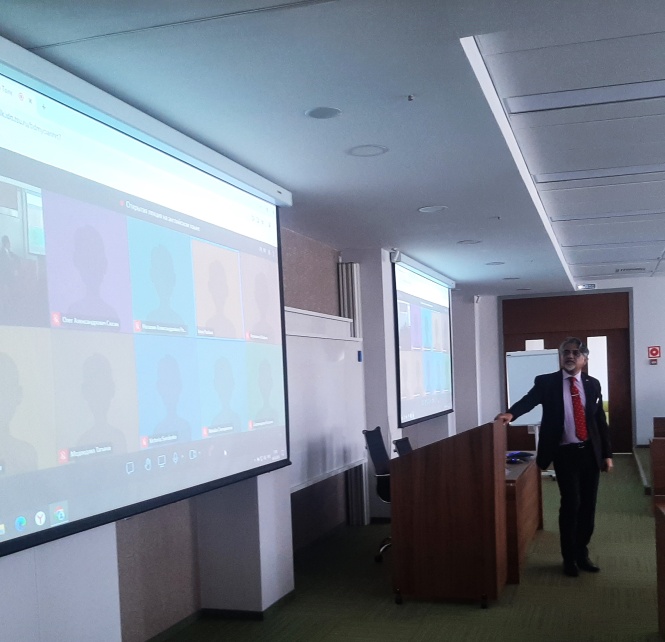
How do political factors affect marketing? Professor Ali Ehsan from Pakistan talked about that during public lecture
Pakistani professor Ali Ehsan gave a lecture to IEM Master students named ŌĆ£Political Factors That Affect MarketingŌĆØ withing the framework of the course ŌĆ£Promotion and Marketing Campaign (Asia-Pacific Region)ŌĆØ
Olga Nedospasova, Master Program Manager: ŌĆ£Professor Ehsan holds the opinion that the politics affect the marketing by two ways: so-called ŌĆśstructuralŌĆÖ and ŌĆśpopulistŌĆÖ. First is determined by the legislation, taxation and existence of a government party ŌĆō everything is quite predictable there. As for the ŌĆśpopulist factorsŌĆÖ everything is much more complicated, because there we speak about some ŌĆśpublic identityŌĆÖ which is closely connected with the ideology and religion. ThatŌĆÖs exactly the populist factors which cost the sharpest and often negative reaction by the society and can lead to devastating consequences in current digital era.ŌĆØ
Concluding the lecture IEM Associate Professor Irina Pavlova said that the lecture was exceptionally practically oriented: ŌĆ£We can all manage tools of strategic analysis or name all the factors of external environment of a company. But real skill of an expert is shown by the ability to systematically comprehend particularities of social-economic setups of different national and regional systems. We all think subjectively and as a rule we overrate the political factors of our own country and underrate those of the countries we donŌĆÖt personally live in. However, the expertise of an international management expert supposes the existence of knowledge, skills and experience of working with different countries. We saw all that on todayŌĆÖs lecture. With the example of four countries (Pakistan, Bangladesh, Philippines and Vietnam) Professor Ali briefed us on the particularities of analysis of political factors that would affect the marketing activity of international companies.ŌĆØ
Chen Huanyu, a master student of ŌĆ£International ManagementŌĆØ program shared his opinion about the lecture: ŌĆ£I am so glad to have participated in the event. During the lecture, the professor used real-life examples to help us understand the subject better. I have to say it was very helpful and interesting┬╗.ŌĆØ
Natalia Cherepanova, IEM Associate Professor: ŌĆ£I liked very much the fact that during the lecture beside the declared subject there was general analysis of external macroenvironment. I was quite impressed with the scale of the analysis.ŌĆØ
Elena Rozhdestvenskaya, IEM Associate Professor: ŌĆ£The lecture was dedicated to the sound topic of geopolitical interaction with the emphasis on the Asia-Pacific region. It was very interesting to listen to the national cases analysis of Pakistan, Bangladesh, Philippines and Vietnam. It is necessary to consider cultural, social and geopolitical particularities of the region in international marketing strategy. As the professor said, the geographical location is the factor one canŌĆÖt change. There were many Chinese students at the lecture, and they asked a lot of questions, since the aforementioned countries are the geographical neighbors of China.ŌĆØ
Dmitriy Konkov, Associate Professor of the Faculty of Historical and Political Studies: ŌĆ£The lecture was beautifully structured and informative and let us draw a parallel with Russian reality despite the considered cases of Asian countries. The Professor offered quite simple but effective method of risk evaluation of business activity in foreign countries.ŌĆØ
Tamara Budlova, FFL Senior Instructor: ŌĆ£The lecture by Professor Ali Ehsan that I was lucky to attend is a great example for IEM students how one should answer direct questions in our difficult time and express opinions which are not always in concurrence with the message by foreign mass media.ŌĆØ
